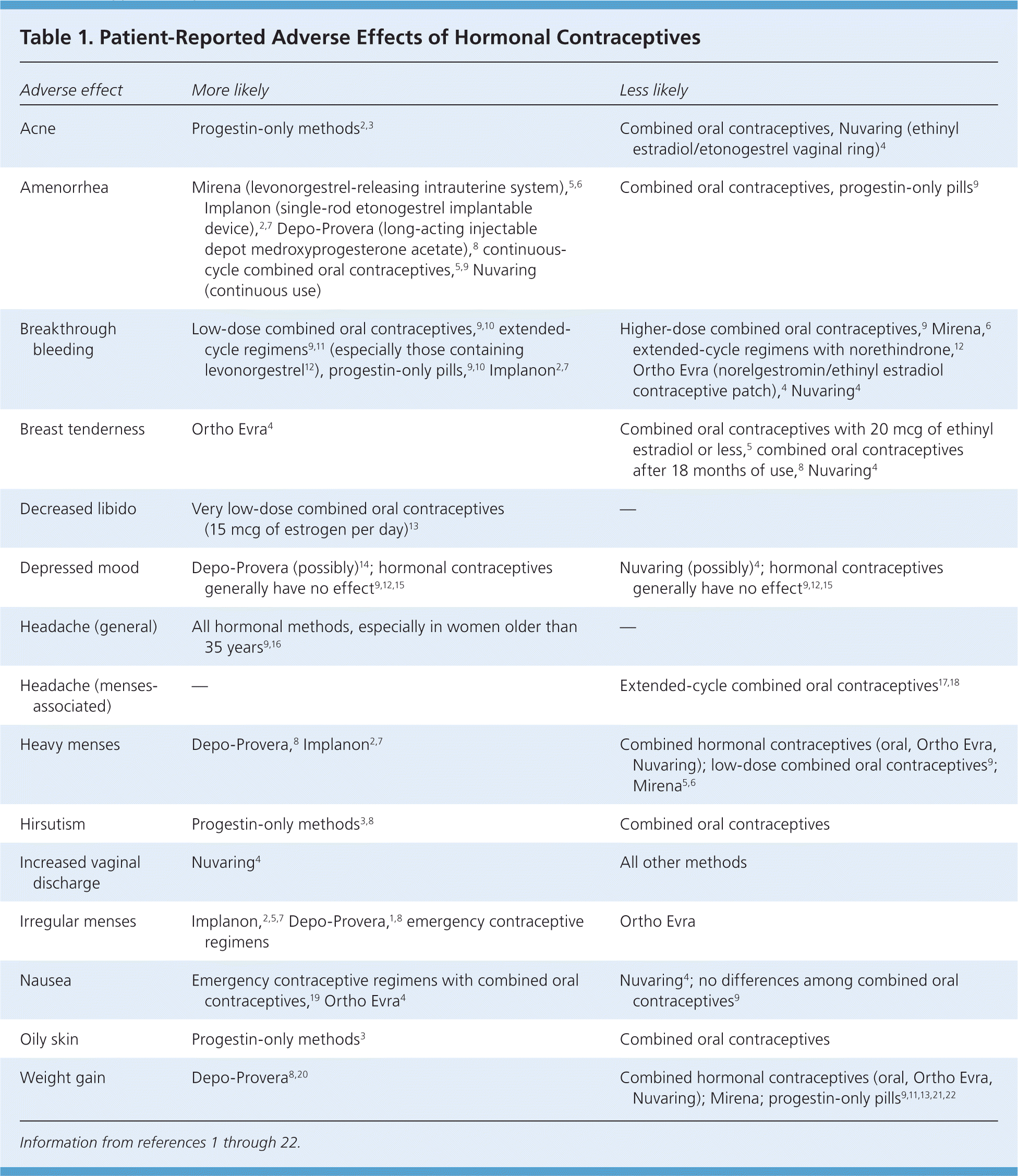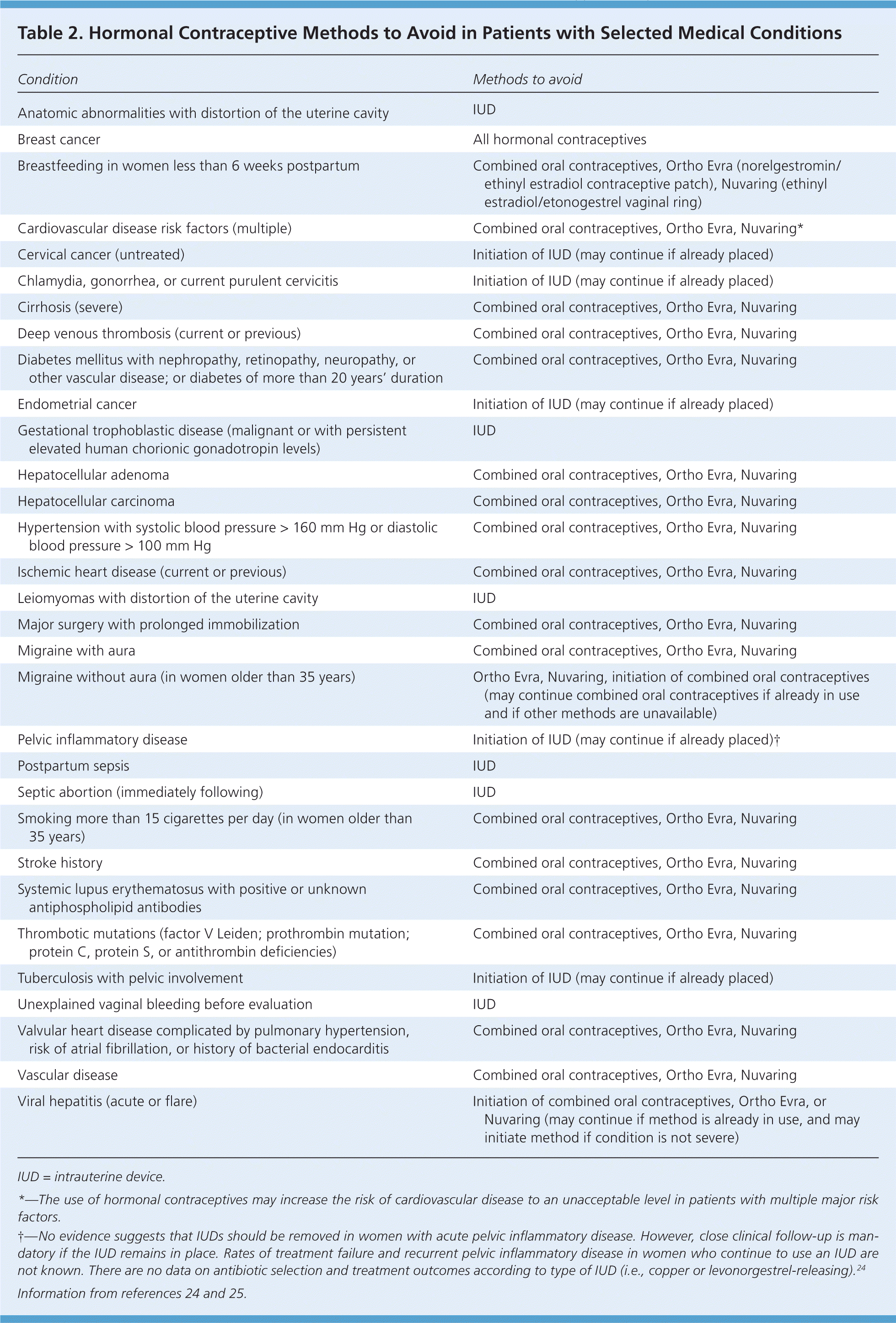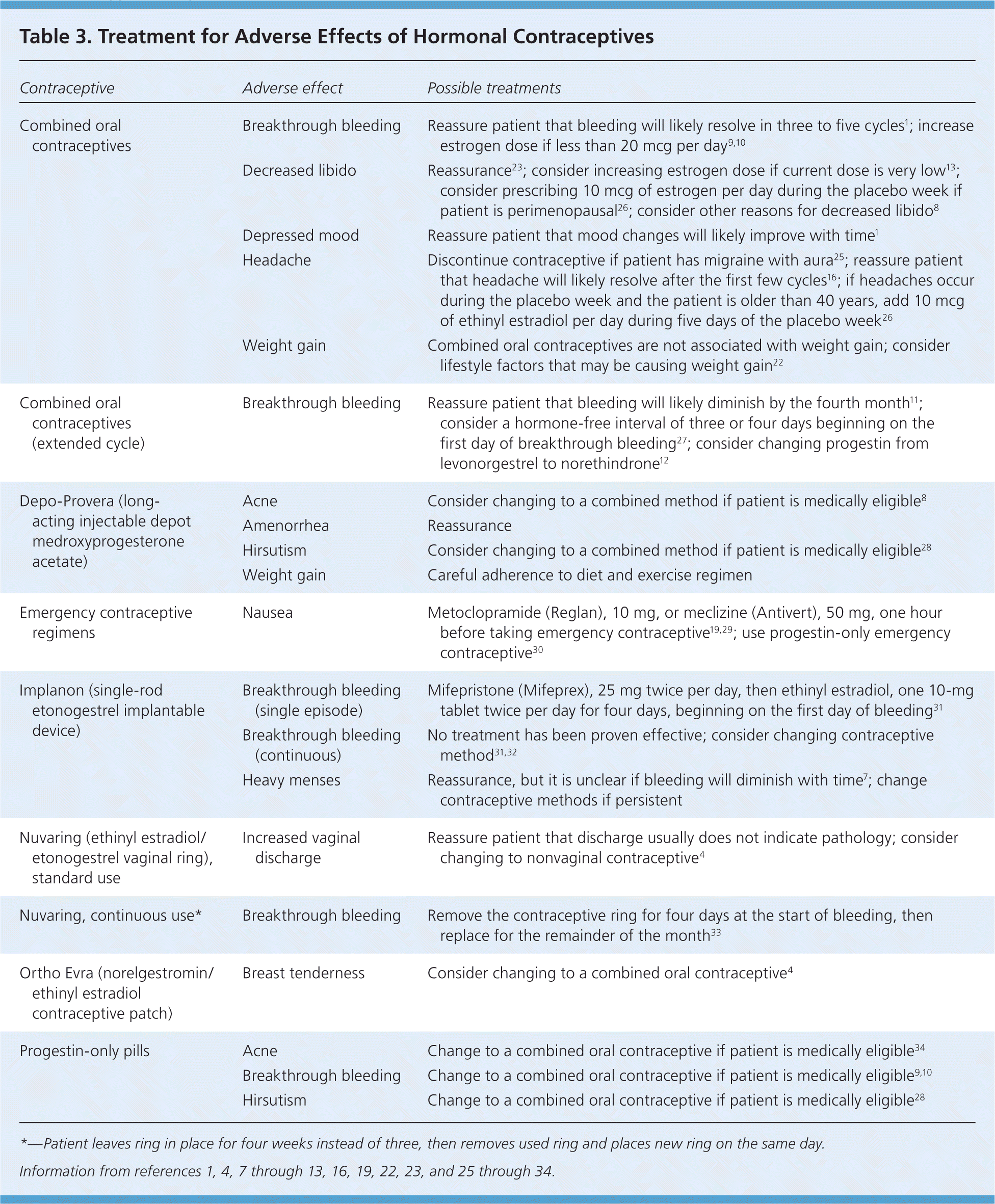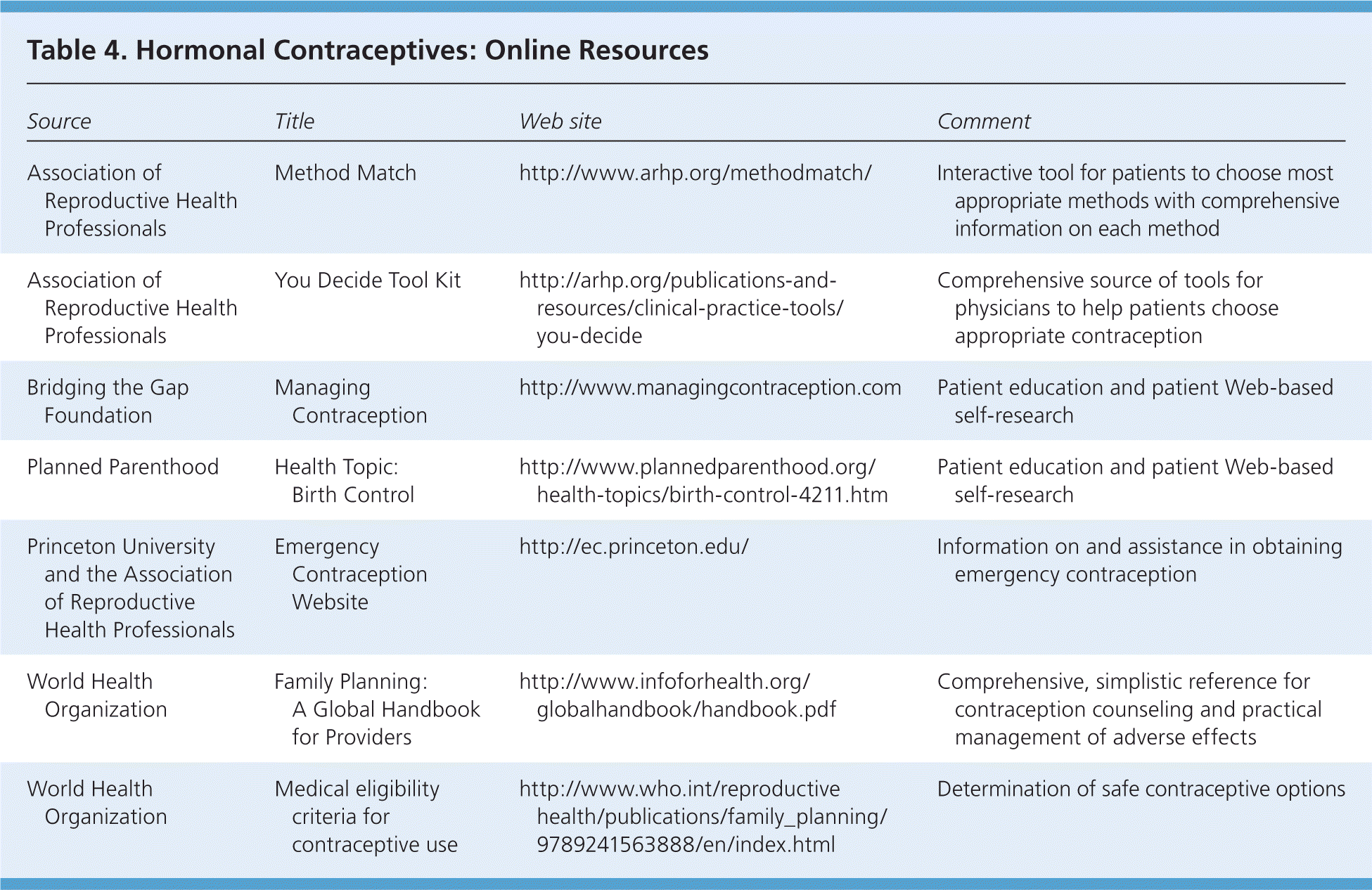Can I Use Triphasic Oral Contraceptives for Continuous Therapy
Adverse effects of hormonal contraceptives usually diminish to the point of acceptance with continued use of the same method. Reassurance that symptoms will likely resolve within three to five months is often the only treatment required. Despite the transient course of these effects, a population-based survey found that 64.6 percent of women who discontinued oral contraceptives did so because of adverse effects.1 Educating patients about common adverse effects of hormonal contraceptives helps to establish realistic expectations (Table 1).1–22

Persistent symptoms are often alleviated by changing methods; however, no method has been proven superior in terms of adverse effects.9 Exogenous estrogen increases production of sex hormone–binding globulin.23 Progestins bind sex hormone–binding globulin and decrease its synthesis to varying degrees, which should result in different levels of androgenicity. However, despite their biochemical differences, progestins have shown few differences clinically.5
Physicians can decrease the likelihood of significant adverse effects by using criteria from the World Health Organization to assess patients for medical eligibility before and during the use of hormonal contraceptives (Table 2).24,25 Table 3 outlines potential treatments for adverse effects of hormonal contraceptives.1,4,7–13,16,19,22,23,25–34


Weight Gain
Long-acting injectable depot medroxyprogesterone acetate (Depo-Provera) is the only hormonal contraceptive that is consistently associated with weight gain. A prospective study found that women who used Depo-Provera gained an average of 11.2 lb (5.1 kg) over 36 months, whereas women who used combined oral contraceptives did not gain any weight.8,20
There are no significant differences among combined oral contraceptives in terms of weight gain.9 A systematic review of randomized controlled trials did not find a causal connection between combined hormonal contraceptives and weight gain,21 whereas a Cochrane review found the evidence to be insufficient.22 Extended-cycle combined oral contraceptives do not cause more weight gain than standard regimens.11 A randomized prospective trial of two combined oral contraceptive regimens and the ethinyl estradiol/etonogestrel vaginal ring (Nuvaring) did not find significant weight gain in any group.13
Headache
Combined oral contraceptives increase the risk of stroke in women who have migraines with aura, and should not be used in these patients.25 A systematic review found that 10 percent of women have new-onset headache with the use of combined oral contraceptives.16 The type and dose of progestin do not affect headache,16 nor does the particular formulation.9
Headaches are more common during the first cycle of combined oral contraceptives and in women who are older than 35 years.16 If headache occurs in a woman who is older than 40 years during the placebo week of a 28-day regimen, the addition of 10 mcg of ethinyl estradiol for five of the seven placebo days may help.26 It is not known if this regimen is effective in younger women. Continuous use of combined oral contraceptives also can be attempted. A Cochrane review comparing extended-cycle with standard 28-day regimens found slightly reduced rates of menses-associated headache in the extended-cycle group.17 A prospective, open-label, industry-sponsored trial found that switching from a 28-day to a 168-day regimen reduced headache and increased quality-of-life measures in patients with severe headaches, but not in those with mild headaches.18 Switching to a different combined oral contraceptive or taking diuretics or multivitamin supplements is not effective in treating headaches.16
Breast Tenderness
The use of combined oral contraceptives decreases breast tenderness after 18 months, but there are no significant differences among formulations.8,9 Breast tenderness is more common in women who use the norelgestromin/ethinyl estradiol contraceptive patch (Ortho Evra) than in those who use combined oral contraceptives.4
Breakthrough Bleeding
Breakthrough bleeding is common in the first months of combined oral contraceptive use,1 and patients should be reassured during this time. Variations in the estrogen dose above 20 mcg do not alter bleeding rates,9 nor does changing the type of progestin.35 Bleeding patterns are similar among monophasic and biphasic regimens,33 but the evidence is insufficient to determine whether monophasic and triphasic regimens result in different bleeding patterns. 36 A randomized controlled trial comparing continuous use with a standard 28-day cycle found that spotting increased initially with continuous use, but was less than with the standard regimen by nine months.11 Increasing the estrogen dosage from 20 to 30 mcg per day does not reduce breakthrough bleeding in extended-cycle regimens. 12 Women on regimens containing norethindrone had significantly more days of amenorrhea than those on levonorgestrel-containing regimens.12 If breakthrough bleeding occurs with extended-cycle regimens, the pills should be stopped for three or four days, then restarted.27
A prospective randomized trial found that women who have breakthrough bleeding for at least five days with continuous Nuvaring use could reduce bleeding by removing the ring at the start of bleeding, storing it for four days, then replacing the same ring.37
Other Bleeding Irregularities
Patients often discontinue hormonal contraceptives because of menstrual cycle disorders.1 Progestin-only pills and low-dose combined oral contraceptives (less than 20 mcg per day) are associated with a higher incidence of bleeding disturbances.9,10 Compared with nonhormonal contraceptive methods, Depo-Provera is strongly associated with missed menstrual periods and bleeding for longer than 20 days.8 A Cochrane review found that no interventions to regulate menstrual bleeding in women using Depo-Provera were useful in the long term.38 In women using progestin-only injectable contraceptives, short-term treatment with nonsteroidal anti-inflammatory drugs may be helpful for spotting.39 Nonsteroidal anti-inflammatory drugs or ethinyl estradiol can also be used for heavy or prolonged bleeding until another contraceptive method is chosen.39,40
Women who use the single-rod etonogestrel implantable device (Implanon) should expect changes in their menstrual cycle.7 Before insertion, physicians should inform patients that only about 11 percent of women have a normal bleeding pattern.2 A combination of mifepristone (Mifeprex) and ethinyl estradiol reduces the duration of a single bleeding episode in women who use Implanon, but does not alter the overall bleeding pattern. 31,32 One study showed that doxycycline shortens a single episode of bleeding in women who use Implanon, 32 but a subsequent larger study did not confirm this finding.31 If abnormal bleeding persists beyond three months, an alternative contraceptive method may be considered, and the patient may need to be evaluated for other causes.40
Mood
No significant differences in effect on mood have been found among various combined oral contraceptives.9,15 A prospective population-based study found that Depo- Provera was associated with a slightly increased rate of depression, which can persist after discontinuation of therapy.14 A prospective cohort study, however, found that neither combined oral contraceptives nor Depo- Provera was associated with an increased risk of depressive symptoms.8,15
Sexual Effects
Findings from studies of the sexual effects of hormonal contraceptives have been inconsistent, and the pharmacologic basis for these effects is unclear.23 Bioavailable testosterone is lower in women who use combined oral contraceptives than in nonusers; however, one review found that women who use these contraceptives show more interest in erotic images.23 Supplementation with androstenedione (illegal in the United States) or testosterone in combined oral contraceptive users with decreased libido is no more effective than placebo.23
A prospective analysis of women using Depo-Provera found no change in sexual function after four months, and women using progestin-only pills had no difference in sexual desire compared with those receiving placebo.23 Another study found that there was no significant change in libido after 24 months among women using Depo- Provera, women taking an oral contraceptive containing 0.15 mg of desogestrel and 20 mcg of ethinyl estradiol, and women using nonhormonal contraception.8 A prospective randomized study comparing Nuvaring with two combined oral contraceptives (one containing 20 mcg of ethinyl estradiol and 100 mcg of levonorgestrel, and the other containing 15 mcg of ethinyl estradiol and 60 mcg of gestodene) found that the latter pill had the greatest negative effect on sexual desire.13 The reason is not known.
If adverse sexual effects persist beyond three months, the method can be changed, but there is little evidence to recommend one method over another. Because sexual function depends on many factors, other causes of sexual dysfunction should be considered before changing methods.8
Skin Changes
Acne can develop or worsen with the use of progestinonly contraceptives. A questionnaire-based study of 161 women who used the levonorgestrel-releasing intrauterine system (Mirena) for dysfunctional uterine bleeding found that 22 percent discontinued use secondary to progestin-associated effects (e.g., acne, oily skin, hirsutism, bloating, headaches, weight gain, depression, breast tenderness, decreased libido).3 A retrospective study of Implanon users found that 11 percent had acne after insertion.2 If acne worsens with a progestin-only contraceptive, a combination method can be tried if the patient is medically eligible.
Of patients who had acne at baseline and who were using a combined oral contraceptive with 20 mcg of ethinyl estradiol and 0.15 mg of desogestrel, 70 percent had resolution of symptoms at six months.8 If acne does not improve within six months of combined oral contraceptive use, it typically will not improve with continued use.8 A Cochrane review analyzing several combined oral contraceptive regimens found that they are effective in treating acne, but that differences in effectiveness among progestins is not clear.34 A separate Cochrane review found that Nuvaring users reported less acne than women taking combined oral contraceptives.4
About 6 percent of Depo-Provera users report newonset facial hair at six months of use.8 Combined oral contraceptives are used to treat hirsutism,28 and a small, prospective, randomized, double-blind study found that those containing levonorgestrel and desogestrel are equally effective.41
Nausea
Levonorgestrel-only emergency contraceptives cause less nausea and vomiting than regimens with a combination of ethinyl estradiol and levonorgestrel.20 Pretreatment with metoclopramide (Reglan) or meclizine (Antivert) can reduce nausea in women using combined oral contraceptives for emergency contraception.29,30 The World Health Organization advises pretreatment for women who have a history of nausea and vomiting with emergency contraceptive use.40 For nonemergency use, there are no significant differences in nausea among combined oral contraceptive formulations.9,12
Decreased Breast Milk
A Cochrane review found insufficient evidence that hormonal contraceptives affects breast milk quantity or quality.42 Combined oral contraceptives should not be used for the first six weeks postpartum because of increased risk of hypercoagulability.25,43 Depo-Provera and progestin-only pills do not impair lactation.43,44
Patient Education
Patient education can decrease the chances of unanticipated adverse effects of hormonal contraceptives. Table 4 lists resources for physicians and patients.

Source: https://www.aafp.org/pubs/afp/issues/2010/1215/p1499.html
Belum ada Komentar untuk "Can I Use Triphasic Oral Contraceptives for Continuous Therapy"
Posting Komentar